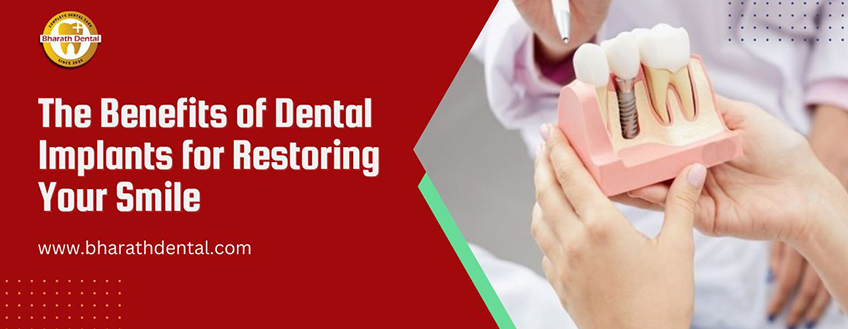Dental implants are an increasingly popular solution for people who are missing teeth. Not only do they restore the appearance of your smile, but they also have functional benefits such as improving speech and chewing ability.
Whether you're considering dental implants or simply want to learn more about this tooth replacement option, keep reading to discover how dental implants can help you restore your smile and improve your quality of life.
What are Dental Implants?
Dental implants are artificial tooth roots that are surgically placed into the jawbone. They are typically made of titanium or other biocompatible materials, which means they are safe and well-tolerated by the human body.
The implants are designed to provide a strong and stable foundation for replacement teeth, which can be attached to the implants once they have fully integrated with the jawbone.
The Benefits of Dental Implants
Dental implants offer a number of benefits that make them an attractive choice for people who are missing teeth. Here are just a few of the benefits that dental implants can provide:
Improved appearance:
Dental implants look and feel like natural teeth, which means they can help restore your smile and boost your confidence.
Enhanced comfort:
Because dental implants are anchored directly into the jawbone, they offer a more comfortable and stable solution than other tooth replacement options such as dentures or bridges.
Improved speech:
Missing teeth can affect speech, but dental implants can help improve speech clarity by restoring proper tooth alignment and allowing for proper tongue placement.
Improved chewing ability:
Dental implants function like natural teeth, allowing you to chew and eat with ease. This means you can enjoy your favourite foods without worrying about discomfort or slippage.
Long-lasting solution:
With proper care and maintenance, dental implants can last a lifetime, making them a cost-effective solution for missing teeth in the long run.
Improved oral health:
Dental implants can help prevent bone loss and other oral health problems that can arise when teeth are missing.
The Dental Implant Process
The dental implant process typically involves several steps, which may vary depending on your specific needs and the complexity of your case.
Here's a general overview of what you can expect during the dental implant process:
Consultation and treatment planning:
During your initial consultation, your dentist or oral surgeon will evaluate your oral health and determine whether you are a good candidate for dental implants.
They may also take X-rays or other imaging tests to assess the condition of your jawbone and determine the optimal placement of the implants.
Implant placement:
If you are a good candidate for dental implants, your dentist or oral surgeon will surgically place the implants into your jawbone.
Depending on the complexity of your case, this procedure may be performed under local anaesthesia or sedation.
Healing and osseointegration:
After the implants are placed, you will need to allow time for the implants to heal and integrate with the jawbone. This process is known as osseointegration and typically takes several months.
Abutment placement:
Once the implants have fully integrated with the jawbone, your dentist or oral surgeon will attach abutments to the top of the implants. These abutments serve as connectors between the implants and the replacement teeth.
Replacement teeth:
After the abutments are in place, your dentist will take impressions of your mouth to create custom replacement teeth. These replacement teeth may be crowns, bridges, or dentures depending on your specific needs.
Follow-up care:
After your replacement teeth are attached to the abutments, your dentist will provide you with instructions for caring for your new teeth. You will also need to schedule regular check-ups to ensure the long-term success of your dental implants.
Are Dental Implants Right for You?
While dental implants offer a range of benefits for restoring your smile, they may not be the right choice for everyone. Here are some factors to consider when deciding whether dental implants are right for you:
Oral health:
To be a good candidate for dental implants, you must have good oral health and sufficient jawbone density to support the implants.
Age:
Dental implants can be placed in patients of all ages, but younger patients may need to wait until their jawbone has finished growing before pursuing this treatment option.
Medical history:
Certain medical conditions, such as uncontrolled diabetes, may affect the success of dental implants. Be sure to discuss your medical history with your dentist or oral surgeon before pursuing this treatment option.
Lifestyle factors:
Dental implants require proper oral hygiene and regular check-ups to ensure their long-term success. If you are unable or unwilling to maintain good oral hygiene, dental implants may not be the right choice for you.
Cost:
Dental implants can be more expensive than other tooth replacement options, but they may offer a more cost-effective solution in the long run due to their long-term durability and low maintenance requirements.
Overall, the decision to pursue dental implants is a personal one that should be made in consultation with your dentist or oral surgeon.
If you are missing teeth and considering dental implants, schedule a consultation to discuss your options and determine whether this treatment option is right for you.
At Bharath Dental Clinic, our experienced team of dental professionals is dedicated to helping our patients in Guntur to achieve healthy and beautiful smiles.
Whether you need dental implants, dentures, root canal treatment, gum treatment, or dental surgeries, we are here to provide the personalised care and attention you need to achieve optimal oral health.


